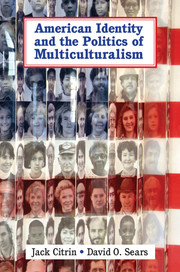Book contents
- Frontmatter
- Dedication
- Contents
- List of Figures
- List of Tables
- Preface
- Prologue
- 1 The Challenge of E Pluribus Unum
- 2 The Political Psychology of Identity Choice
- 3 Contours of American National Identity
- 4 The Ethnic Cauldron and Group Consciousness
- 5 Public Opinion and Multiculturalism’s Guiding Norms
- 6 When Do Ethnic and National Identities Collide?
- 7 Group-Conscious Policies: Ethnic Consensus and Cleavage
- 8 The Dynamics of Group-Conscious Policy Preferences
- 9 Multiculturalism and Party Politics
- 10 Conclusion
- Appendices
- Bibliography
- Index
- References
6 - When Do Ethnic and National Identities Collide?
Published online by Cambridge University Press: 05 September 2014
- Frontmatter
- Dedication
- Contents
- List of Figures
- List of Tables
- Preface
- Prologue
- 1 The Challenge of E Pluribus Unum
- 2 The Political Psychology of Identity Choice
- 3 Contours of American National Identity
- 4 The Ethnic Cauldron and Group Consciousness
- 5 Public Opinion and Multiculturalism’s Guiding Norms
- 6 When Do Ethnic and National Identities Collide?
- 7 Group-Conscious Policies: Ethnic Consensus and Cleavage
- 8 The Dynamics of Group-Conscious Policy Preferences
- 9 Multiculturalism and Party Politics
- 10 Conclusion
- Appendices
- Bibliography
- Index
- References
Summary
Adopting a social identity inevitably requires drawing boundaries between “us” and “them.” Nevertheless, in a complex society, individuals usually belong to several overlapping groups, forming multiple social identities that contrast with varied sets of others. The modern person is made up of a mixture of loyalties and identifications: national, regional, linguistic, religious, social, and professional – identities that expand or contract as people’s lives change. The ingredients in one’s mix of social identities thus shift over time, often expanding as one acquires an occupation and plants roots in a specific community or disappearing, as when one leaves a church or emigrates.
The existence of multiple identities raises the problem of prioritization, and in this chapter we examine the balance between nationality and ethnicity. Which takes precedence, loyalty to nation or pride in ethnic group? In the limiting case of an ethnically homogeneous society, nationality and ethnicity completely overlap, and the possibility that national and ethnic identities clash is moot. They are one and the same, so patriotism and feeling close to your own ethnic group are bound together. Japan is Japanese, and so the idea of a loyal, but hyphenated, Japanese identity has no meaning.
- Type
- Chapter
- Information
- American Identity and the Politics of Multiculturalism , pp. 145 - 174Publisher: Cambridge University PressPrint publication year: 2014



